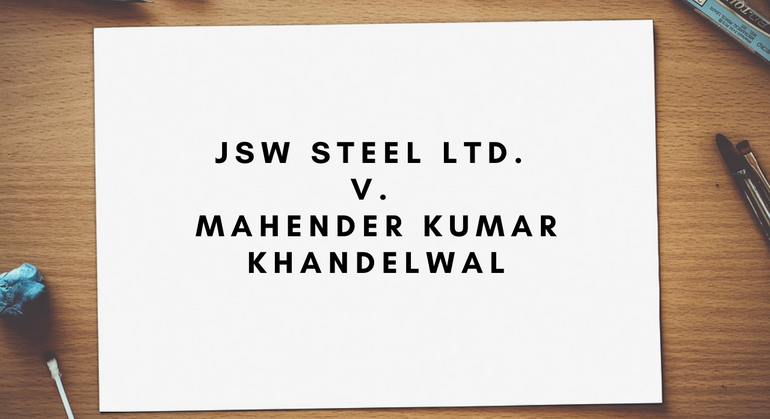

JSW Steel Ltd. v. Mahender Kumar Khandelwal
The conflict between the Insolvency and Bankruptcy Code, 2016 and the Prevention of Money-Laundering Act, 2002 has once again surfaced with a stay order being passed by the National Company Law Appellate Tribunal (NCLAT) in the present case (Company Appeal (AT) (Insolvency) No. 957 of 2019) on 14th October 2019.
On 5th September 2019, the National Company Law Tribunal (NCLT), Principal Bench, New Delhi had passed an order sanctioning the resolution plan submitted by JSW Steel Limited for the insolvency resolution of Bhushan Power and Steel Limited (NCLT Order). Thereafter, on 10th October 2019, properties of Bhushan Power in Odisha were attached by ED, the same being declared as “proceeds of crime” under the Prevention of Money-Laundering Act, 2002. The attachment of the property of the Bhushan Power was opposed by the Ministry of Corporate Affairs, Government of India (MCA), JSW Steel, and the committee of creditors of Bhushan Power.
The following submissions were made by the Ministry of Corporate Affairs (MCA):
- ED has no jurisdiction to attach the property of a corporate debtor which is undergoing corporate insolvency resolution process and particularly when an appeal is pending consideration of the issue of attachment of property. As per the process envisaged under IBC, once a resolution plan is approved by the adjudicating authority, it is binding on all stakeholders including all governmental agencies.
- Any investigation of a corporate debtor by the Central Bureau of Investigation, Serious Fraud Investigation Office, and or the ED are separate and independent of the corporate insolvency resolution process under the IBC and both can run simultaneously and independent of each other.
- The erstwhile management of a company would be held responsible for the crimes committed under their regime. The new management taking over the company, pursuant to the Insolvency and Bankruptcy Code process cannot be held responsible for the acts of the previous management. Therefore, no criminal liability can be fixed on the resolution applicant or new management of the company.
- As far as the corporate debtor or its assets are concerned, after the completion of the corporate insolvency resolution process under the Insolvency and Bankruptcy Code, there cannot be any attachment or confiscation of the assets of the corporate debtor by any enforcement agencies after the approval of the resolution plan.
- The threat of attachment of the assets of the corporate debtor or subjecting the corporate debtor to proceedings by investigating agencies for wrongdoings of the previous management will defeat the very process and scheme of the corporate insolvency resolution process, which is to hand over the company of the corporate debtor to the resolution applicant. The resolution of insolvency, the revival of the company, and the realization of dues would be derailed by such attachment. Attaching the property which is now in the hands of a resolution applicant or new promoters would only negate the very purpose of the Insolvency and Bankruptcy Code and eventually destroy the value of assets.
The ED, while conducting their investigation under the Prevention of Money Laundering Act, is free to deal with or attach the personal assets of the erstwhile promoters and other accused persons, acquired through crime proceeds and not the assets of the corporate debtor which have been financed by creditors and acquired by bona fide third parties pursuant to the statutory process under the Insolvency and Bankruptcy Code.
Where the resolution applicant is concerned, they would not be in wrongful enjoyment of any proceeds of crime after the acquisition of the corporate debtor and its assets, as a resolution applicant would be a bona fide party acquiring assets through a legal procedure. Upon an acquisition under the statutory process by a resolution applicant, the corporate debtor and its assets are not derived or obtained through proceeds of crime under the Prevention of Money Laundering Act and need not be subject to attachment by the ED after approval of the resolution plan by the adjudicating authorities.
Issues
The following were the issues that arose for consideration before National Company Law Appellate Tribunal (NCLAT):
- Whether ED has jurisdiction to attach the property of a corporate debtor or part thereof which is undergoing a ‘corporate insolvency resolution process’
- Whether ED comes within the meaning of ‘operational creditor’ under Insolvency and Bankruptcy Code for the purpose of money claim (civil matter), which may be generated out of the attached property or part thereof of the corporate debtor.
Judgment
The Hon'ble National Company Law Appellate Tribunal (NCLAT), after considering the submissions of the Ministry of Corporate Affairs (MCA) and the steps were taken by the 'Directorate of Enforcement', held that 'Directorate of Enforcement' is prohibited from the attachment of any property of the 'Corporate Debtor' without prior permission of the National Company Law Appellate Tribunal (NCLAT). Moreover, the property which has been already attached shall be released in favor of the 'Resolution Professional' immediately.
Further, the Hon'ble National Company Law Appellate Tribunal (NCLAT) has also held that in case assets are seized by the Enforcement Directorate and finally if it is proven that the assets were purchased out of the 'proceeds of crime', such a sum generated out of the assets will come within the meaning of 'Operational Debt' payable to the Enforcement Directorate and hence the Enforcement Directorate may file a claim in terms of the provisions of the Code.
Furthermore, in regard to the Related party issue, the Directorate of Enforcement alleged that since 'Bhushan Power and Steel Limited' (Corporate Debtor) and 'JSW Steel Limited' (Successful Resolution Applicant) is holding 24.09% and forty-nine equity respectively in the joint venture company i.e. 'Rohne Coal Company Private Limited' they should be treated as Related party thus making them ineligible.
The Hon'ble National Company Law Appellate Tribunal (NCLAT) while considering the issue held that pursuant to Section 32A (1) (a) of the Insolvency and Bankruptcy Code, and the definition is given under Section 5(24) of the Insolvency and Bankruptcy Code, it is clear that 'JSW Steel Limited' cannot be considered as an associate company or related party of the 'Corporate Debtor' by virtue of their investment in downstream joint venture company i.e. 'Rohne Coal Company Private Limited'. Instead 'Rohne Coal Company Private Limited' will be considered as an 'associate company' of both the 'Corporate Debtor' as well as of the 'Successful Resolution Applicant'.
Furthermore, it stated that in accordance with the directions of the Central Government if they are made to form a consortium or joint venture to carry out the business such person cannot be made ineligible on basis of Section 32A (1) (a) by stating that they are related parties.



